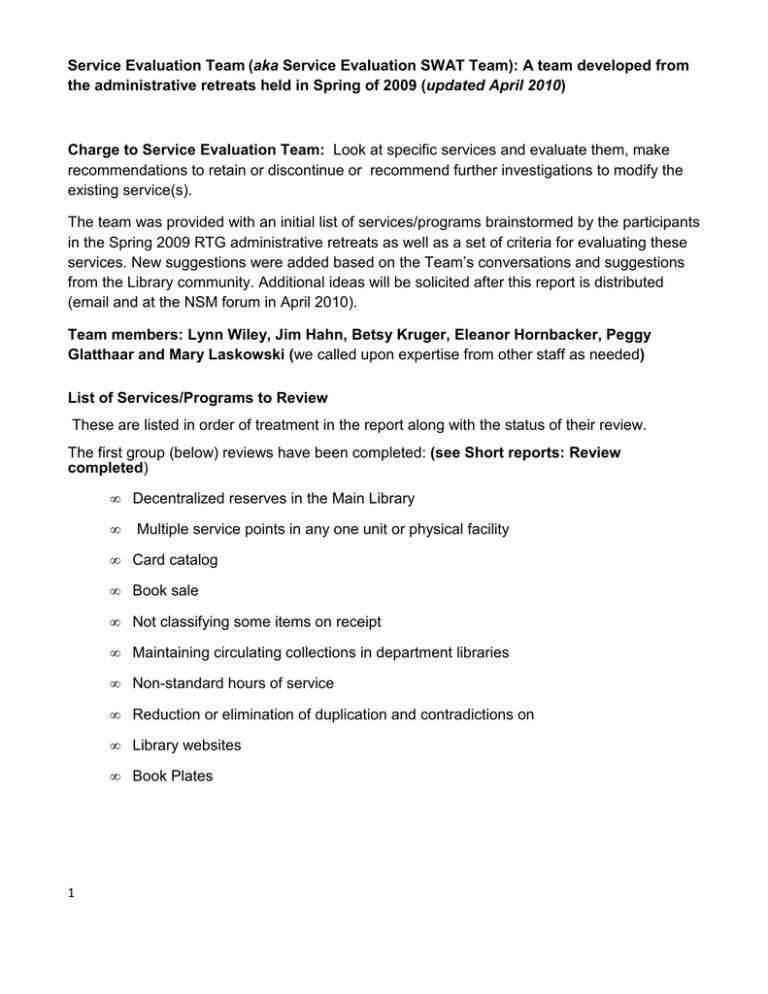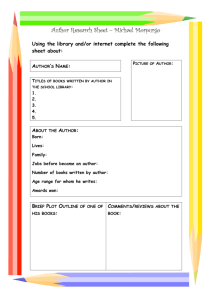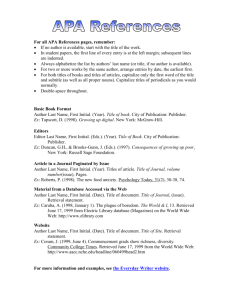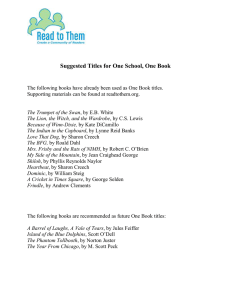Service Evaluation Team aka updated April 2010
advertisement

Service Evaluation Team (aka Service Evaluation SWAT Team): A team developed from the administrative retreats held in Spring of 2009 (updated April 2010) Charge to Service Evaluation Team: Look at specific services and evaluate them, make recommendations to retain or discontinue or recommend further investigations to modify the existing service(s). The team was provided with an initial list of services/programs brainstormed by the participants in the Spring 2009 RTG administrative retreats as well as a set of criteria for evaluating these services. New suggestions were added based on the Team’s conversations and suggestions from the Library community. Additional ideas will be solicited after this report is distributed (email and at the NSM forum in April 2010). Team members: Lynn Wiley, Jim Hahn, Betsy Kruger, Eleanor Hornbacker, Peggy Glatthaar and Mary Laskowski (we called upon expertise from other staff as needed) List of Services/Programs to Review These are listed in order of treatment in the report along with the status of their review. The first group (below) reviews have been completed: (see Short reports: Review completed) 1 • Decentralized reserves in the Main Library • Multiple service points in any one unit or physical facility • Card catalog • Book sale • Not classifying some items on receipt • Maintaining circulating collections in department libraries • Non-standard hours of service • Reduction or elimination of duplication and contradictions on • Library websites • Book Plates This second group have more longer reports appended that require followup . (see InDepth reports: Review Completed) • Book delivery to campus offices • Decentralized serials check-in • Claiming of serials (merged with Decentralized checkin) The following are still under review • Physically browsable "New Book" collections: Work ongoing • The need for the "perfect" catalog record: Work Ongoing • Buying multiple copies of a book held by other I-Share libraries: Draft to be submitted shortly based on the work done by Lynn Wiley and Tina Chrzastowski with CARLI on IShare title overlap • Exceptional DDC classification schemes: take on this work was sent to EC A proposal for a new team to Criteria for evaluation as outlined at the Library Retreat * Does it align with our strategic priorities? * Does it represent "best practices" of the profession? * Is it transformative? That is, does it allow us or our users to be more productive or do other things differently? * Are we assuming users want this service? Have we asked them? * Would anyone notice if this service ceased? * Is its infrastructure or support sustainable? * Does someone else on campus offer it? Can it be outsourced? Are there more effective ways to offer the service if indeed it is needed? Service Reviews: Status = Short reports: Review Completed • Decentralized reserves in the Main Library Decentralized reserves require our users to collect needed coursework material from many physically separate places which is a disservice. It also requires units to staff service points that could be well supported centrally. The closing of the LIS library offered an opportunity 2 to move this function for LIS to Central Circulation. The renovations of the Central Circulation service area provided the space to shelve this material. In 2009, the LIS reserve materials were successfully moved to the central location. This success prompted the English Library and HPNL to follow suit. The traffic was easily handled, the materials wellhoused with users seeing enhanced access, in terms of hours and convenience, to needed course material. IPM had already aptly demonstrated their capacity to handle the ingest and processing of the online and print reserves. Central Circulation has also now demonstrated that they can handle the circulation of these materials. The Services team recommends that other units within Main and indeed any other unit that closes earlier than Grainger or Undergrad, move to this model to offer the best service to their users. One group of material may need a separate solution for which there are options. This is for the category of material referred to as “permanent” reserves, titles that are in perpetual demand and require short loans to ensure that they are available to users when needed. As they are used with other similar titles within a unit, they must remain in that unit. The options for handling this category of material include changing the item type to a short loan That way, the items would be clearly distinguished from course reserves, but with the desired circulation period. These short loan materials could be placed either in the unit or in Central Circulation. For short loan items remaining in a unit with short hours, the ability to retrieve on demand from a unit that may be closed when a user requests access would enhance the user experience. The latter option would require more investigation. • 3 Multiple service points in any one unit or physical facility: The group agreed that this is resolving itself as the budgetary constraints have required all to streamline their operations. The group simply recommends that all units look to innovative solutions to maintain services with consolidation of service points and shared staff, and keep the needs of our constituents in mind as we consider our future options. We have heard from our user surveys that users value specialized services and highly trained librarians, but are frustrated by inconvenient hours, the lack of consistency in hours across the Library and the need to visit multiple locations for a single research project. There are many precedents already for reducing service points from the Interlibrary Loan Office consolidation to the mergers with Modern Languages and English, History and Newspaper Library and the closing of LIS, Labor and CPLA. Centralizing some functions as described above with the reserves service is a solution in itself, but also makes these transitions easier by providing support for basic services that are common to all users. With these basic services handled centrally, librarians and staff serving specific subjects may have more time to develop specialized services for their users. Users do welcome streamlined access. The Group did recognize that the constraints of the building in Main and elsewhere can limit the scale of renovation for consolidated service points, but also recognizes that the NSM process affords an opportunity for all to offer suggestions for change. Through the NSM program, funds are available to support the transition to new services and small-scale remodeling • Card catalog: As part of the Circ Desk reconfiguration, one of the Stacks Services Working Groups, coordinated the shift of the shelf-list cases that were near the Info Desk up to the 3rd floor and the recycling of almost all of the non-shelf list segments of the catalog (a couple of dozen cases). The remaining non-shelf list elements, the serials catalog and the thesis file, are still heavily used by reference librarians. The working group explored the option of relocating the shelf list to a more remote location, but convincing arguments were raised by reference staff and catalogers that continued access was needed until such time as we can do a systematic search for records missing in Voyager. The bulk searching for this project could be performed student workers and circulation desk staff who would recycle the records found and pass those needing attention to cataloging staff, but this project would require coordination. The group recommends that a small group of staff from CAM recommend how and when to relocate the shelf list, but suggest that this be a low priority project as there are more pressing issues with greater immediate benefit. • Book sale: Tom Teper and Mary Laskowski have already worked very successfully on a new model on gift book processing and distribution. Gift books are now being processed through IPM. Titles that are being added to the collection receive minimal handling and no classification and go to Oak St. (see next item Not classifying some items on receipt below). Titles not added are either discarded (damaged material) or set aside for sale. In 2009, Tom Teper developed and implemented a one day program for the book sale event because over 80% of past years sales occurred on day 1. Additionally, an agreement was reached with a dealer for the third-party sale of the unwanted gift titles. The final revenues realized are projected to be similar to those taken in over the traditional two day sale. This newly revised program is much more cost effective. The Library recognizes the event is a beloved community tradition. The book sale will continue but is now reduced to a smaller, more manageable and less labor intensive program. • Not classifying some items on receipt This is already being trialed, with demonstrated success. One example is the gift processing described above. The Latin American Blanket Order backlog was also treated selectively this way. These projects have allowed us to develop guiding principles that support the decision to handle some material in this manner. Nothing we purchase is sent to Oak St unless it has a record with an OCLC number. Preferably this is a full record but it may not yet be. We allow for the Bib notification overlay when a record is enhanced as the OCLC is the match point. Acquisitions is experimenting with scanning the TOCs and adding subject headings or adding the TOCs to notes for searching to supplement access in lieu of classification. This program is underway now and will be reported upon in 2010. 4 • Maintaining circulating collections in department libraries The question here is whether departmental libraries, particularly those in the Main Library building, should continue to maintain separate circulating points. This model has been proposed for the soon-to-be-formed International and Area Studies Library, which will have current periodicals, a reference collection, and microforms, but no circulating items. That way, the associated circulating collection remain in a single sequence on the shelf in Main Stacks. Without circulating collections, libraries can continue to provide access to specialized materials, with a focus on those that require expert guidance or specialized equipment, as well as arenas for library outreach and education for the online collections. It may be more appropriate to call them “reading rooms” or “commons” depending on the focus. We should be sure we offer a variety of options to support collaborative learning and individual research as well as seminars and classroom interactions. These spaces should be open hours that fit the users’ schedules, and should not necessarily be set aside for a certain category of use from a specific school or college. These areas require comfortable furniture, adequate lighting and battery recharge options and some level of staffing that may include scheduled office hours for research consultation and teaching. • Non-standard hours of service o Frustration with inconsistent or inadequate hours has been expressed in multiple user surveys, including the Spring 2008 LibQUAL results. Findings from that survey show that “the Library is perceived as not meeting the needs of the respondents…for convenient service hours” and recommends that the Service Advisory Committee submit a plan to AC that would “Define no more than three tiers of hours (in addition to Undergrad and Grainger) with clear, simple criteria for assignment of units to those tiers.” o See also “Decentralized reserves in the Main Library” and “Multiple service points in any one unit or physical facility” which address related issues pertaining to access to materials and providing a more seamless experience of library as place. • Reduction or elimination of duplication and contradictions on Library websites The CMS is accomplishing this as well as the work ongoing by the Office of Services. • Book Plates A small group has worked over the last year to develop digital book plates to enhance access to donor supported acquisitions and to reduce the labor of tracking and applying book plates. Voyager limitations have delayed the addition of the digital thumb nails of book plates but 852 notes are now being added to the record for most every special fund acquired title (back until 2003). Once we move into the latest version of Web Voyage, those digital book plates will be added for new acquisitions. A final work flow was developed in March 2010 and the retrospective work to add the notes will be done by summer 2010. No new physical book plates need to be applied after July 1 which has been approved by the 5 Office of Advancement. Most ARL libraries are moving to this type of process and many have dropped the labor intensive process of adding the physical book plates. Service Reviews: Status = In Depth reports: Review Completed Campus Book Delivery Recommendations January 2010 One service identified to be reviewed as part of the Spring 2009 administrative retreat and ensuing Service Evaluation Team charge A review of the service was accomplished by a subset of the Service Evaluation group. This smaller task force included Lynn Wiley, Peggy Glatthaar, Betsy Kruger and Susie Duncan and with Scott Mann providing background. They looked at the costs of the service and also outlined possible steps to take to better instruct users in the pick up options. The group made recommendations as outlined below. Overview Cost The Central Circulation staff provided an excellent review of the last five years of the service. The statistics collected provided an overview of the use and were also used to develop formulas to determine a cost per transaction. We looked back to the year 2000 and found that the campus mail service use has dropped significantly. The peak was in 2002 with 25,000 campus mails annually and was down to 15,000 by 2008 (when other pick up options numbered close to 28,000). The implementation of the default pick up location for the request option (Central Circulation desk) in 2002 was a large factor in the decline in numbers as was the decline in circulation decline overall. The Systems Office ran a report to count campus mail options for 2009 for all units and that number was 14,000. Based on the monthly figures now being collected, that trend continues with a projected annual total of 13000, for FY2010. The cost per use for campus mail based on 2009 activity is: $ 2. 20 There are costs for HOLD pick up as well: Cost per pick up when the home library is the pick up $ .50 per item When the item is routed from Home to another campus pick up: $1.00 per item * *Based on the need for processing for Shipping, Shipping campus delivery, route in at pick up location General findings on Mail Option/Pick Up costs: 6 • All options incur a cost ranging from .50 to 2.20. • Campus Mail option is used less every year and is a little more then half of all options selected by users • We should renegotiate Shipping charges as the activity has greatly decreased from 2002. That cost paid to the campus Mail service is over 7,000 per year. • Campus Mail takes longer then a pick up option with pick up at the home library the fastest and cheapest service. • Options for access to requested material could be clarified Recommendations The Service Evaluation Team recommends we continue campus mail service but that we work on reducing the use with better information provided to users for pick up services. For the remaining campus mail deliveries, we suggested that we work to reduce the paper used in the service. We also recommend a future meeting with Campus Central Mail administration to review the charges for delivery highlighting the greatly reduced volume. We concluded that the Campus Mail Option service is an important feature for our users and should be continued. We have provided optimal access to print monographs with this service, with more online offerings we will continue to have less foot traffic and as more titles are moved to storage, we must offer options for access. Campus Mail offers a great convenience to our faculty and graduate students and is required to assist any user with mobility issues. It is an enormously popular service. There is an added expense but the group concludes that cost may be reduced. It does take longer so a pick up does offer faster access and we should make that point. The group recommends additional work as follows: Education: • Enhanced website on requesting options that highlights options for pick up over Campus Mail, it will include an interactive service to link a user to the closest pick up to their office address. • This site will also cover a new campaign to reduce the carbon footprint of the service by the use of reusable canvas bags that will be charged out to the user on their library card. We will be testing these bags in early summer (awarded a Marketing grant to do so) and will assess their use and make a final recommendation by Sept 2010. • We also plan a brief survey of regular users to be sure we understand their use of the service and to clarify the cost, the time required and the options available to any user. LWiley January 2010 7 Service Reviews: Status = In Depth reports: Review still in draft March 2010 Decentralized serials check-in and claiming (merged as they overlap) DRAFT One service identified to be reviewed as part of the Administrative retreat and ensuing Service Evaluation Team charge Acquisitions staff gathered statistics on recurring print subscriptions based on invoicing handled at Acquisitions as not all serials are received by Acquisitions, some go direct to a unit. Those can also include gift or exchanges that never incur an invoice so the recurring titles may be underestimated here. The unit ran reports to collect statistics on the drop in the checkin as a result of moving to online only, a trend that will only continue. The unit head worked with staff who gathered the claims statistics with a sampling of the success rate. Statistics Number of Serial Titles recurring for 2010 for all units: over 17,000 titles**, this includes standing orders, it does not include the contract titles (Elsevier, Springer etc) that are no longer paid by the title from Voyager so not included in a title report. These are online and therefore have no check in. A majority of the 17,000 titles are received centrally and many of these are online and already have no corresponding print. Serial issues checked in centrally in 2009: 39,000 in 2007 a drop of 20,000 issues from 2006 count of close to 59,000. Number of titles that went online only this year: 400, from previous years: 2009: 250; 2008; 585; 2007 560 Note that some titles were cancelled so the flips and cancels together account for the drop in checkin. Some conclusions from the figures above: The number of print only serial titles not currently checked in centrally is small. Central Circulation now handles over 7,000 titles (based on the current check records); another 5,000 issues were added with the Slavic group which corresponds to about 600 titles. Government publications are being handled separately. Serial titles that go direct to units through EBSCO are in the hundreds and still dropping as we drop print but there are many titles that are gifts or single title orders. The LIS closing illustrated this; for every title that was checked in centrally, there was another received direct by that unit through long standing gifts and exchange programs. The latter are items that can not be claimed or tracked and their handling requires careful consideration of the labor required to maintain them vs. the access that may be available on the web. 8 Number of serial claims made in 2009: 2040 on EBSCO titles and another 600 claimed against publisher directly. Number of claims made that resulted in receipt of an overdue issue (only available for EBSCO titles) 200 confirmed as received, another 200 in process still with little direct communication from the publisher, less then 1/6th of the claims made had a good result. The single largest reason for an unsuccessful claim was that the issue was no longer available and was out of stock even when an issue was claimed immediately after its release. ** based on reports run on what was paid for title by title, not the contract titles we now pay for by fund level Pos and not aggregator databases which included many thousands of other serial titles we have access to. This report was merely an attempt to estimate those paid for print serial titles we have left. Recommendations The Voyager check in system provides the best return on investment only for those titles that will remain in print and that are already received centrally. If local units have a system that works well and they are not going to be merging anytime soon, we recommend that their current practice continue. Recommend: Centralize the checkin for any library that will be moving or merging as part of NSM plans. Continue to support the transition to online only subscriptions when that is appropriate. Plan to review the Government Documents serial titles as well as the Canadian and the current Slavic receipts that recently moved under central Acquisition to investigate options for dropping print if online access meets our criteria for best access. Do not checkin annuals: Titles received only once a year (annuals) do not require a check in process. Acquisitions is identifying these titles and is closing the components and check in. These titles are treated as added volumes to existing MFHDS and may be shelved with older issues. Recommend that this practice continue. Minimize checkin if shelving centrally i.e. Central Stacks).Acquisitions is experimenting with a hybrid model to manually check for claims and binding needs for those issues sent directly to Stacks. The stack current serial title components and patterns will default to one pattern requiring minimal maintenance. This is expected to be done this summer and is a final process in the dismantling of the central stacks current display location. More information will be available later on this experiment. Claims: Recommend that units continue to bind incomplete when print runs are backed by online access. Multiple claims on single issues are simply not productive. Only one claim will 9 be processed per issue by Central Acquisitions. All evidence indicates that the print issues are simply not available. Recommend that supervisors encourage staff to understand that binding incomplete is not a disservice as few users are consulting the bound volumes. Acquisitions will be working more closely with CAM serial cataloging and maintenance to investigate best ways to collaborate on serial issue maintenance. One example is to create a process to do set up and add to summary holdings statements that are very effective in describing content owned and are much less labor intensive. More information will be forthcoming on this collaboration. Overview Serial checkin provides a mechanism to confirm receipt of an issue, to display that receipt on the public interface, to facilitate label printing, to automatically identify skipped issues for a claims process and with Voyager, provides for a binding module. In a multi-unit environment where titles come in centrally and then are sent on to another location, it makes sense to utilize a checkin system because a search and look up for issue routing is already required. If a library has one central reading room, a complicated checkin system is not always warranted because staff can then shelf new issues in sequence, find the missing, and gather a complete run for binding simply with routine shelf checks. Voyager Check in and UIUC Voyager: the system implementation is very labor intensive as a base serial record (component) must be set up along with a pattern and these are linked to the purchase and payment history as well as the bibliographic and holding records. Maintenance is mandated due to the very nature of serials that have for example frequent title and pattern changes. No updates make the automatic claims and binding module worthless. To support the system, it requires staff dedicated to monitoring serial changes and then cross checking, confirming the permanent nature of the change for a record update. We currently rely on students to do the checkin and staff monitor their work. Check in staff would be the first to notice a pattern change or title change but students don’t identify the changes easily so close supervision is required. In a complex environment such as ours, where serial work can be distributed, there are unintended consequences to routine work as one unit does not understand how their updates may impact another’s. For example serial volumes are often transferred and the MFHDs updates may not be done correctly such that the PO links are lost or a check in locations is changed in error. When a title has ceased, to complete a PO requires shutting down a component and completing any outstanding claim. This can result in too many steps for too 10 little return. It is important to create workflow that will address a need and one that won’t in the process erase all gains with the creation of unsustainable workflows. The serial checkin question must also be examined in the context of the changing environment. We are moving to online access, the easier core titles that central acquisitions has been responsible for are now online (see recommendations for other potential titles) and now some of the more complicated continuations are also going online. No checkin is required for these. But it does mean that the harder print titles are left though these too are a smaller group. More print titles are ceasing because of lack of readership as the material is available freely on the web or because a publisher discontinues print in lieu of a web link to a pdf (for user access and not offered as an institutional subscription). Exchanges have also dropped with the growth of institutional or society repositories and shrinking budgets. The print that is left is more complicated as it is often irregular with issues are delayed or will be titles merged as publishers cope with less revenue. The point here is that these will require maintenance and support. Timelines in check in implementation The migration from III to the Voyager system was complete in 2005. Maria Porta who completed this work left in 2006 and was not replaced. A temporary AP position helped cover her work but that GSLIS graduate relocated to another state and a graduate student worked though that year on documentation for staff to use. In 2006 a trial to train unit staff to handle their own check on site was begun. It was generally successful but the training and ongoing support was difficult as anyone doing the work will also require in-depth serials experience and access to full cataloging in Voyager for bib and holdings maintenance. Other units also experimented with the minimum of component set up but found the work very labor intensive and have discontinued the component setup work (Natural History, Government Documents). Since that time one additional staff member dedicated to serial check in retired and was not replaced. The unit adopted tools to allow for batch updates to MFHDS to help address routine record updates previously handled by staff. Staff were cross trained in check in work and picked up the work when back logs occurred. Since 2006-the unit worked with selectors and the Eresources Librarian to drop duplicative print format serials. This reduced print handling and provided extra funds back to selectors needing to meet their serial inflation gap. 11 Claims Claims are handled centrally when issues are checked in centrally. Issues received directly by a unit are claimed by that unit. Serial subscriptions for print plus online are no longer routinely identified in the claim reports generated from the Voyager system as this resulted in needless claim review. Acquisitions will handle one claim for these, if an issue does not arrive, units have been asked to bind these incomplete as the full runs are available online. LWiley March 2010 edited April 2010 12





